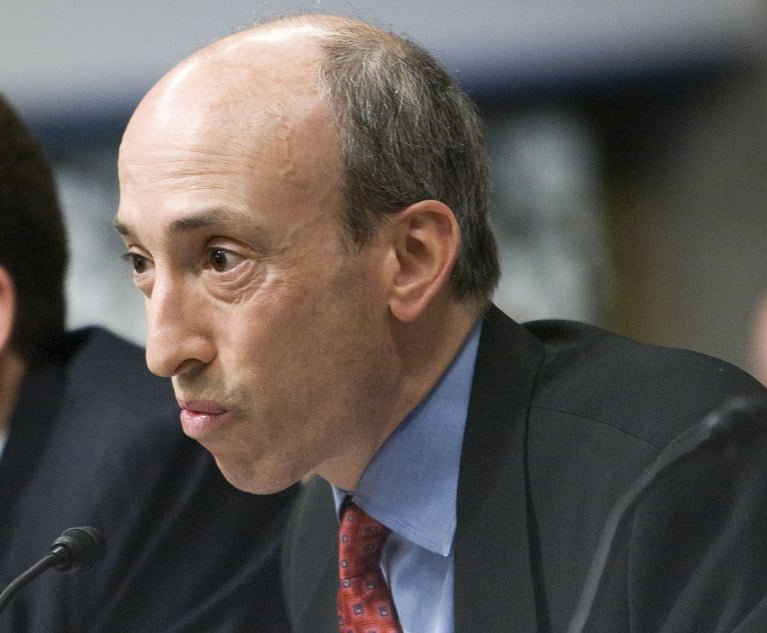Donald Trump’s reclaiming of the White House could spell the end of one of the most aggressive SEC rulemaking and enforcement regimes in history.
Experts and legal observers say that Americans should expect a more measured Securities and Exchange Commission during Trump’s second term; less gung-ho about testing novel legal theories and pushing the boundaries of its enforcement authority and more concerned with issues affecting Main Street and everyday retail investors.
“We’ve already seen what the SEC in a Trump 1.0 administration looked like, where the SEC focused on bread-and-butter cases focused on addressing harm to retail investors, such as offering frauds, Ponzi schemes and excessive fees charged by investment advisory firms,” said Jennifer Lee, a Jenner & Block partner who formerly spent 12 years with the SEC, rising to assistant regional director of its enforcement division.
By contrast, the SEC under current Chair Gary Gensler has been more willing to bring individual compliance cases against public companies and investment firms it regulates, even if there is no actual investor harm, she said.
Preemptive compliance measures were at the center of Gensler’s ambitious regulatory agenda. Observers said he wanted to get ahead of issues that, if left unchecked, could lead to greater fraud or investor harm down the road.
“The SEC under Chair Gensler has been aggressive in terms of really putting in prospective requirements in emerging substance areas like cybersecurity, ESG and also AI,” Lee said. She expects that, under the Trump administration, the SEC will likely pull back on rulemaking and adopt a less stringent stance on enforcement, particularly when it comes to pushing the bounds of existing rules.
Trump already has vowed to fire Gensler “on day one” and appoint a replacement. One credible successor is Robinhood Chief Legal, Compliance and Corporate Affairs Officer Dan Gallagher, who was an SEC commissioner from 2011 to 2015, according to people familiar with the discussions.
Also well-respected in the legal community and a potential successor are Hester Pierce, who has been a Republican GOP commissioner since 2017 and is known for her incisive dissents. Chris Giancarlo, a former chair of the Commodity Futures Trading Commission, who is now a partner at Willkie Farr & Gallagher, is another contender.
Legal observers say that, under a new chair, the SEC likely will abandon ESG rulemaking and will stop trying to implement its new rule requiring public companies to disclose greenhouse gas emissions. That rule is on hold amid challenges by industry groups and Republican-run states.
In July, a federal judge sided with software firm SolarWinds on the question of whether the provisions of the the Securities Exchange Act that give the SEC authority to regulate accounting controls also give it authority over cybersecurity controls. The judge “resoundingly rejected” that premise, finding that the SEC was overreaching, Aravind Swaminathan, a partner at Orrick, Herrington & Sutcliffe, told Law.com at the time.
Lee said the SEC under its next chair will be less likely to test its legal boundaries.
“There will be more of a hewing to tried and true legal theories,” she said. “The SEC under Trump will generally be more skeptical of novel theories in enforcement actions. The posture will also matter—the SEC may be more open to novel theories that will be litigated before a court or tried in front of a jury, versus theories that companies may feel they have to settle just to move on from an issue.”
She also anticipates that the SEC will be less exacting in its demands around cyber-incident disclosures and will shy away from bringing enforcement actions in instances where regulatory violations may have occurred but there is no evidence of consumers being harmed.
Last month, the commission fined four companies that it said downplayed intrusions into their systems and misled investors about their cybersecurity risks, an action that brought a strong dissent from Pierce and fellow GOP commissioner Mark Uyeda.
Lee said that, in the future, the SEC might not require minute details like the identity of a threat actor or the percentage of data exfiltrated from a company’s systems, issues that came into play in its enforcement action against the four companies.
Instead, she and other attorneys expect the SEC’s focus to shift back to staple issues like retail fraud, calculation of fees and conflicts of interest associated with financial incentives, as well as ensuring that firms aren’t misrepresenting themselves to consumers.
“While the issues of what’s in the best interest of an investor will continue to be important, we won’t see as much energy put behind trying to expand those obligations beyond the regulatory frameworks that already exist,” said Jennifer Klass, a partner at K&L Gates and member of its asset management and investment funds practice.
“Ultimately what the SEC’s priorities are is going to depend on the new chair, but I would expect that their approach to rulemaking and enforcement would be more consistent with what we saw during the first Trump administration.”
